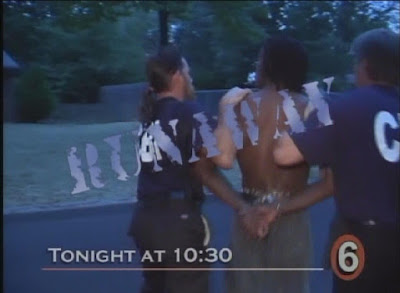
Many authors have imagined how history would have been different had the Confederate states won the civil war, but few filmmakers have approached the subject.
CSA is a false document, a documentary from a parallel universe. Director Kevil Willmott cleverly apes the style of Ken Burns, the filmmaker responsible for hugely influential works such as Jazz, The Civil War, Mark Twain, Baseball, and others. Like Burns, Willmott incorporates photographs, audio recordings, paintings and early film footage to build a compelling historical narrative - but in Willmott's case, it is an imagined history.
In CSA, the Confederacy triumphs by successfully enslisting the aid of Britain and France; Lee wins at Gettysburg, the North falls, and a black-faced Abraham Lincoln is captured while attempting to use Harriet Tubman's underground railroad to escape to Canada.

A scene from the allohistorical DW Griffith classic, The Hunt for Dishonest Abe.

Tubman is hanged; Lincoln is jailed for two years and then exiled to Canada. The Confederate flag is raised over the White House, and for nonwhites living in the former USA, this image is a nightmarish harbinger of a bleak future.
History unfolds as you might expect. Chinese labourers in the American west are enslaved; war is waged on the plains Indians, as in our history; the CSA builds an empire, invading Mexico, Central America, the Caribbean, and South America and enslaving their populations. Canada becomes the only non-slave state in the western Hemisphere, and a black exodus to Canada begins, leading to a north-south Cold War; the "Cotton Curtain," a concrete wall thousands of kilometres long, is built along the Canada-US border, and Canada benefits from the influx of blacks; rock and roll is born in the north, while US culture stagnates. There are moments of progress; Republican John F. Kennedy defeats Democrat Richard Nixon and promises emancipation...with predictable results for the charismatic young President.
But all in all, Willmott presents a bleak future for this alternate Earth, one perhaps best revealed not in the documentary that makes up the bulk of the film, but in the commercials broadcast over the San Fransisco television station broadcasting it.

Watch Runaway, a reality show depicting dedicated CBI agents capturing runaway slaves. Obviously modeled on Cops, this short segment is profoundly disturbing - because the shows are so alike. Just as on Cops, blacks are pursued, shackled and carted off by grimacing whites. The obvious question: is our reality really that much better than the one presented in the film?

Darky toothpaste, for a "jigaboo bright" smile.

Satire? Yes. But, unbelievably, Darky toothpaste, Sambo oil, and the Coon Chicken Inn were all real products and services. Darky toothpaste is still marketed today in some parts of the world, and the Coon Chicken Inn operated until the 1950s. I knew about the Coon Chicken Inn, but the other products lampooned in the film were unknown to me. The film's coda, a brief explanation of the differences between the false history presented in CSA and history in the real world, points out that the commercialization of slavery remains with us today, in the form of products such as Uncle Ben's rice and Aunt Jemima's pancake syrup. (Before watching this film, I didn't know that "Aunt" and "Uncle" were common antebellum terms for household slaves.)
CSA is dark, funny, and educational. Little heralded, it's well worth a viewing.


As a fan of alternate histories and a bit of a US Civil War buff, I find this mockumentary concept absolutely fascinating! Where did you come across it? How do I come across it?
ReplyDeleteNot having seen this yet, so far I still prefer the comic 'Captain Confederacy' for their take on a modern day victorious South. They explore a modern day CSA as having not won the war, but successfully seceded, which was after all their original intention. They also postulate a culture more in common with 1980s South Africa and their apartheid policies as opposed to one where slavery was still legal. (The idea of Britain giving overt aid to the Confederates prior to the abolition of slavery seriously undermines the premise in my eyes.) That being said, I still really want to see it! Nice review, Earl.
Stephen
Hey Stephen,
ReplyDeleteI ran across a review for this on one of the DVD sites I frequent, and picked it up because it sounded interesting. It certainly proved to be that, particularly the coda. I can bring over the DVD for you on Oscar night, presuming that's still on.